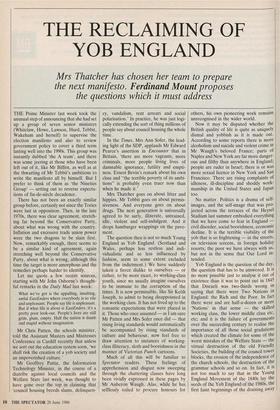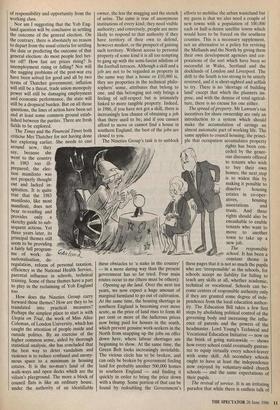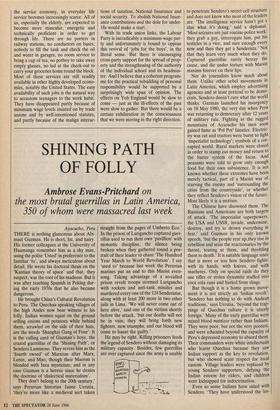THE RECLAIMING OF YOB ENGLAND
Mrs Thatcher has chosen her team to prepare the questions which it must address
THE Prime Minister last week took the unusual step of announcing that she had set up a group of seven senior ministers (Whitelaw, Howe, Lawson, Hurd, Tebbit, Wakeham and herself) to supervise the election manifesto and also to review government policy to cover a third term lasting well into the 1990s. This group was instantly dubbed 'the A team', and there was some jeering at those who have been left out of it, like Mr Biffen, as well as at the thwarting of Mr Tebbit's ambitions to write the manifesto all by himself. But I prefer to think of them as 'the Nineties Group' — setting out to reverse expecta- tions of fin-de-siècle decadence.
There has not been an exactly similar group before, certainly not since the Tories were last in opposition. Then, in the late 1970s, there was clear agreement, stretch- ing far beyond the Conservative Party, about what was wrong with the country. Inflation and excessive trade union power were the two dragons to be slain first. Now, remarkably enough, there seems to be a similar kind of agreement, again stretching well beyond the Conservative Party, about what is wrong, although this time the target is more amorphous and the remedies perhaps harder to identify.
Let me quote a few recent sources, starting with Mr John Osborne's thought- ful remarks in the Daily Mail last week:
What we've got is the appalling, insulting, awful EastEnders where everybody is so vile and unpleasant. People say life is unpleasant. But if what life is about is EastEnders, it's a pretty poor look-out. People's lives are still grim, glum, empty. Half the nation is dumb and stupid without imagination.
Mr Chris Patten, the schools minister, told the Assistant Masters and Mistresses Conference in Cardiff recently that unless we sort out the education system soon, 'we shall risk the creation of a yob society and an impoverished culture.'
Mr Geoffrey Pattie, the Information Technology Minister, in the course of a diatribe against local councils and the Welfare State last week, was thought to have gone over the top in claiming that `council housing breeds slums, delinquen- cy, vandalism, rent arrears and social polarisation.' In practice, he was just logi- cally extending the sort of thing millions of people say about council housing the whole time.
In the Times, Mrs Ann Sofer, the lead- ing light of the SDP, applauds Mr Edward Pearce's assertion in Encounter that in Britain, 'there are more vagrants, more criminals, more people living lives of damnable ignorance, futility and empti- ness. Ernest Bevin's remark about his own class and "the terrible poverty of its ambi- tions" is probably even truer now than when he made it.'
Mrs Thatcher goes on about litter and hippies. Mr Tebbit goes on about permis- siveness. And everyone goes on about drugs. The next generation is universally agreed to be surly, illiterate, untrained, idle, violent and self-indulgent. And it drops hamburger wrappings on the pave- ment.
The question then is not so much Young England as Yob England. (Scotland and Wales, perhaps less restless and indi- vidualistic and so less influenced by fashion, seem to some extent excluded from the indictment.) We have suddenly taken a fierce dislike to ourselves — or rather, to be more exact, to working-class youth, since we usually imagine ourselves to be immune to the corruption of the times. It is now permissible, like Sir Keith Joseph, to admit to being disappointed in the working class. It has not lived up to the romantic expectations that were placed in it. Those who once assumed — as I am sure Mr Patten and Mrs Sofer once did — that rising living standards would automatically be accompanied by rising standards of culture and behaviour, now feel free to draw attention to instances of working- class illiteracy, sloth and boorishness in the manner of Victorian Punch cartoons.
Much of all this will be familiar to Spectator readers. These feelings of apprehension and disgust now sweeping through the chattering classes have long been vividly expressed in these pages by Mr Auberon Waugh. Alas, while he has selflessly toiled to procure honours for others, his own pioneering work remains unrecognised in the wider world. Now it may be disputed whether the British quality of life is quite as uniquely dismal and yobbish as it is made out. According to some reports there is more alcoholism and suicide and violent crime in Mr Waugh's beloved France; parts of Naples and New York are far more danger- ous and filthy than anywhere in England; people are ruder in Israel; there is or was more sexual licence in New York and San Francisco. There are rising complaints of idleness, ill-discipline and shoddy work- manship in the United States and Japan too.
No matter. Politics is a drama of self- images, and the self-image that was pro- jected across the terraces of the Heysel Stadium last summer embodied everything that we have come to fear in England civil disorder, social boorishness, economic decline. It is the terrible visibility of the yob that is so frightening — in the streets, on television screens, in foreign holiday resorts; the poor we have always with us, but not in the sense that Our Lord in- tended.
Yob England is the question of the day, the question that has to be answered. It is no more possible just to analyse it out of existence than it was to point out in 1845 that Disraeli was two-thirds wrong in saying that there were Two Nations in England: the Rich and the Poor. In fact there were and are half-a-dozen or more `Nations' in that sense — the skilled working class, the lower middle class etc, etc; and it is the failure of governments over the succeeding century to realise the importance of all those social gradations which created the climate for some of the worst mistakes of the Welfare State — the virtual destruction of the old Friendly Societies, the building of the council tower blocks, the erosion of the independence of the church schools, the destruction of the grammar schools and so on. In fact, it is not too much to say that in the Young England Movement of the 1840s lay the seeds of the Yob England of the 1980s, the first faint beginnings of the draining away of responsibility and opportunity from the working class.
Nor am I suggesting that the Yob Eng- land question will be conclusive in settling the outcome of the general election. On the contrary, there is absolutely no reason to depart from the usual criteria for settling the date or predicting the outcome of that general election: do most people feel bet- ter off? How fast are prices rising? Is unemployment rising or falling? Nor will the nagging problems of the post-war era have been solved for good and all by two terms of Thatcher government; inflation will still be a threat, trade union monopoly power will still be damaging employment and economic performance, the state will still be a dropsical burden. But on all those questions, the lines of action have been set and at least some common ground estab- lished between the parties. There are fresh fields to be explored.
How does the Nineties Group carry forward those themes? How are they to be translated into practical measures? Perhaps the simplest place to start is with Utopia on Trial, the work of Miss Alice Coleman, of London University, which has caught the attention of people inside and outside politics. By an exercise of the higher common sense, aided by thorough statistical analysis, she has concluded that the best way to deter vandalism and violence is to reduce confused and anony- mous space to a minimum in housing estates. It is the no-man's land of the walk-ways and open decks which are the villain's playground. The more a block of council flats is like an ordinary house, under the authority of an identifiable owner, the less the mugging and the stench of urine. The same is true of anonymous institutions of every kind; they need visible authority; and conversely, people are more likely to respond to that authority if they have territory of their own to defend, however modest, or the prospect of gaining such territory. Without access to personal property of some kind it is all too tempting to gang up with the semi-fascist nihilism of the football terraces. Although a skill and a job are not to be regarded as property in the same way that a house or £10,000 is, they are properties in the technical philo- sophers' sense, attributes that belong to one, and this belonging not only brings a feeling of self-respect but is intimately linked to more tangible property. Indeed, in 1986, if you have not got a skill, there is increasingly less chance of obtaining a job than there used to be; and if you cannot afford to move or cannot find a house in southern England, the best of the jobs are closed to you. The Nineties Group's task is to unblock these obstacles to 'a stake in the country' — in a more daring way than the present government has so far tried. Four main routes occur to me (there must be others): Opening up the land. Over the next ten years, we now expect a huge amount of marginal farmland to go out of cultivation. At the same time, the housing shortage in southern England is becoming ever more acute, as the price of land rises to form 40 per cent or more of the ludicrous prices now being paid for houses in the south, which prevent genuine work-seekers in the North from snapping up the jobs on offer down here, where labour shortages are beginning to show. At the same time, the Green Belt looks increasingly inviolable. The vicious circle has to be broken, and can only be broken by government finding land for probably another 500,000 homes in southern England — and finding it quickly in order to bring the price down with a thump. Some portion of that can be found by redoubling the Government's efforts to mobilise the urban wasteland but my guess is that we also need a couple of new towns with a population of 100,000 each or half-a-dozen satellite towns which would have to be forced on the southern counties. This is a necessary supplement, not an alternative to a policy for reviving the Midlands and the North by giving them their own development agencies and cor- porations of the sort which have been so successful in Wales, Scotland and the docklands of London and Liverpool. The drift to the South is too strong to be utterly reversed, and it is short-sighted and selfish to try. There is no 'shortage of building land' except that which the planners im- pose, and with the demise of total agricul- ture, there is no excuse for one either.
dissolve housing estates in co-oper- atives, housing associations and trusts. And these rights should also be encashable to enable tenants who want to move to another town to take up a new job.
The responsible school. It has been a constant theme in these pages that it is not so much the pupils who are 'irresponsible' as the schools, for schools accept no liability for failing to teach any skills at all, whether academic, technical or vocational. Schools can be- come centres of responsible authority only if they are granted some degree of inde- pendence from the local education author- ity. The Education Bill takes a few first steps by abolishing political control of the governing body and increasing the influ- ence of parents and the powers of the headmaster. Lord Young's Technical and Vocational Education Initiative — now on the brink of going nationwide — shows how every school could eventually guaran- tee to equip virtually every school-leaver with some skill. All secondary schools ought to have at least the independence now enjoyed by voluntary-aided church schools — and the same expectations of their pupils.
The revival of service. It is an irritating paradox that while there is endless talk of the service economy, in everyday life service becomes increasingly scarce. All of us, especially the elderly, are expected to become more muscular, energetic and technically proficient in order to get through life. There are no porters in railway stations, no conductors on buses, nobody to fill the tank and check the oil and water in garages, no room service to bring a cup of tea, no potboy to take away empty glasses, no lad at the check-out to carry your groceries home round the block. Most of these services are still readily available in other highly developed econo- mies, notably the United States. The easy availability of such jobs is the natural way to accustom teenagers to the work habit. They have disappeared partly because of minimum wage levels insisted on by trade unions and by well-intentioned statutes, and partly because of the malign interac- tions of taxation, National Insurance and social security. To abolish National Insur- ance contributions and the dole for under- 18s would make a start.
With its trade union links, the Labour Party is ineradicably a minimum-wage par- ty and unfortunately is bound to oppose this revival of lobs for the boys', in the literal sense. But there is encouraging cross-party support for the spread of prop- erty and the strengthening of the authority of the individual school and its headmas- ter. And I believe that a coherent program- me for the practical rebuilding of personal responsibility would be supported by a surprisingly wide span of opinion. The effects on Yob England would be slow to come — just as the ill-effects of the past were slow to gather. But there would be a certain exhilaration in the consciousness that we were moving in the right direction.




















































 Previous page
Previous page